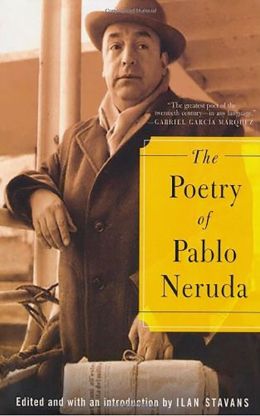



Was Chilean poet Pablo
Neruda poisoned by the Pinochet dictatorship?
The remains of Chilean Nobel
prize-winning poet Pablo Neruda were exhumed this to determine if he died of cancer
or was poisoned by the Pinochet dictatorship he strongly opposed. This is the controversary that peeped up this year...yesterday was
the 40th death anniversary of this great poet,,,lets have a look over this
personality !!!
Born in Parral, Chile, on July 12, 1904, poet
Pablo Neruda stirred controversy with his affiliation with the Communist Party
and his outspoken support of Joseph Stalin, Fulgencio Batista and Fidel Castro, but his poetic
mastery was never in doubt, and for it he was awarded the Nobel Prize for
Literature in 1971.
EARLY LIFE
- Pablo
Neruda was born Ricardo Eliecer Neftalí Reyes Basoalto in the Chilean town
of Parral in 1904.
- His
father worked for the railroad, and his mother was a teacher (she died
shortly after his birth).
- At
age 13, he began his literary career as a contributor to the daily La
Mañana, where he published his first articles and poems.
- In
1920, he contributed to the literary journal Selva Austral under
the pen name Pablo Neruda, which he assumed in honor of Czech poet Jan
Neruda.
Growing Popularity
- Some
of his early poems are found in his first book, Crepusculario
(Book of Twilight), published in 1923, and one of his most renowned
works, Veinte poemas de amor y una canción desesperada (Twenty
Love Poems and a Song of Despair), was published the following
year.
- Twenty
Love Poems made Neruda a celebrity, and he
thereafter devoted himself to his poetry.
- In
1927, Neruda began his long diplomatic career (in the Latin American
tradition of honoring poets with diplomatic posts), and he moved
frequently around the world.
- In
1935, the Spanish Civil War began, and Neruda chronicled the atrocities,
including the execution of his friend Federico García Lorca,
in his España en el corazón (Spain in Our Hearts).
- Over
the next 10 years, Neruda would leave and return to Chile several
times.
- Along
the way, he was named Chile's consul to Mexico and won election to the
Chilean Senate.
- He
would also begin to attract controversy, first with his praise of Joseph Stalin (in poems
such as "Canto a Stalingrado" and "Nuevo canto de amor a
Stalingrado") and later for his poetry honoring Fulgencio Batista("Saludo a
Batista") and Fidel
Castro.
- Always
left-leaning, Neruda joined the Communist Party of Chile in 1945, but by
1948 the Communist Party was under siege, and Neruda fled the country with
his family.
- In 1952, the Chilean government withdrew its order to seize
leftist writers and political figures, and Neruda returned to Chile once again.
Accomplishments and Death
- For
the next 21 years, Pablo Neruda continued to write prodigiously (the
collection of his complete works, which is continually being republished,
filled 459 pages in 1951; by 1968 it amounted to 3,237 pages, in two
volumes), rising in the ranks of 20th century poets.
- He
also received numerous prestigious awards, including the International
Peace Prize in 1950, the Lenin Peace Prize and the Stalin Peace Prize in
1953, and the Nobel Prize for Literature in 1971.
- Neruda
died just two years after receiving his Nobel Prize on September 23, 1973,
in Samtiago, Chile.
Some of his quotes...!!
· Love is so short and forgetting so long.
Was Chilean poet Pablo
Neruda poisoned by the Pinochet dictatorship?
The remains of Chilean Nobel
prize-winning poet Pablo Neruda were exhumed this to determine if he died of cancer
or was poisoned by the Pinochet dictatorship he strongly opposed. This is the controversary that peeped up this year...yesterday was
the 40th death anniversary of this great poet,,,lets have a look over this
personality !!!

